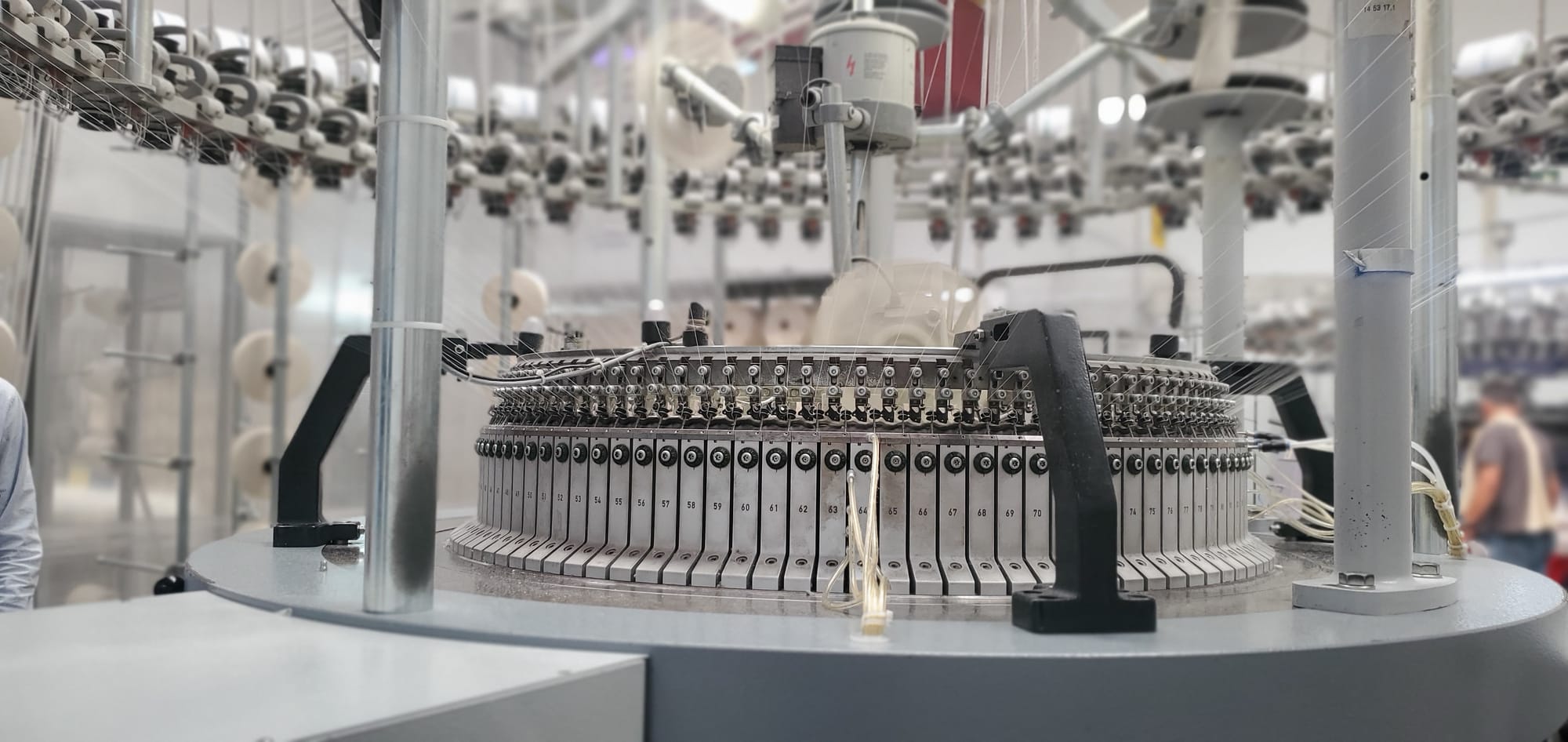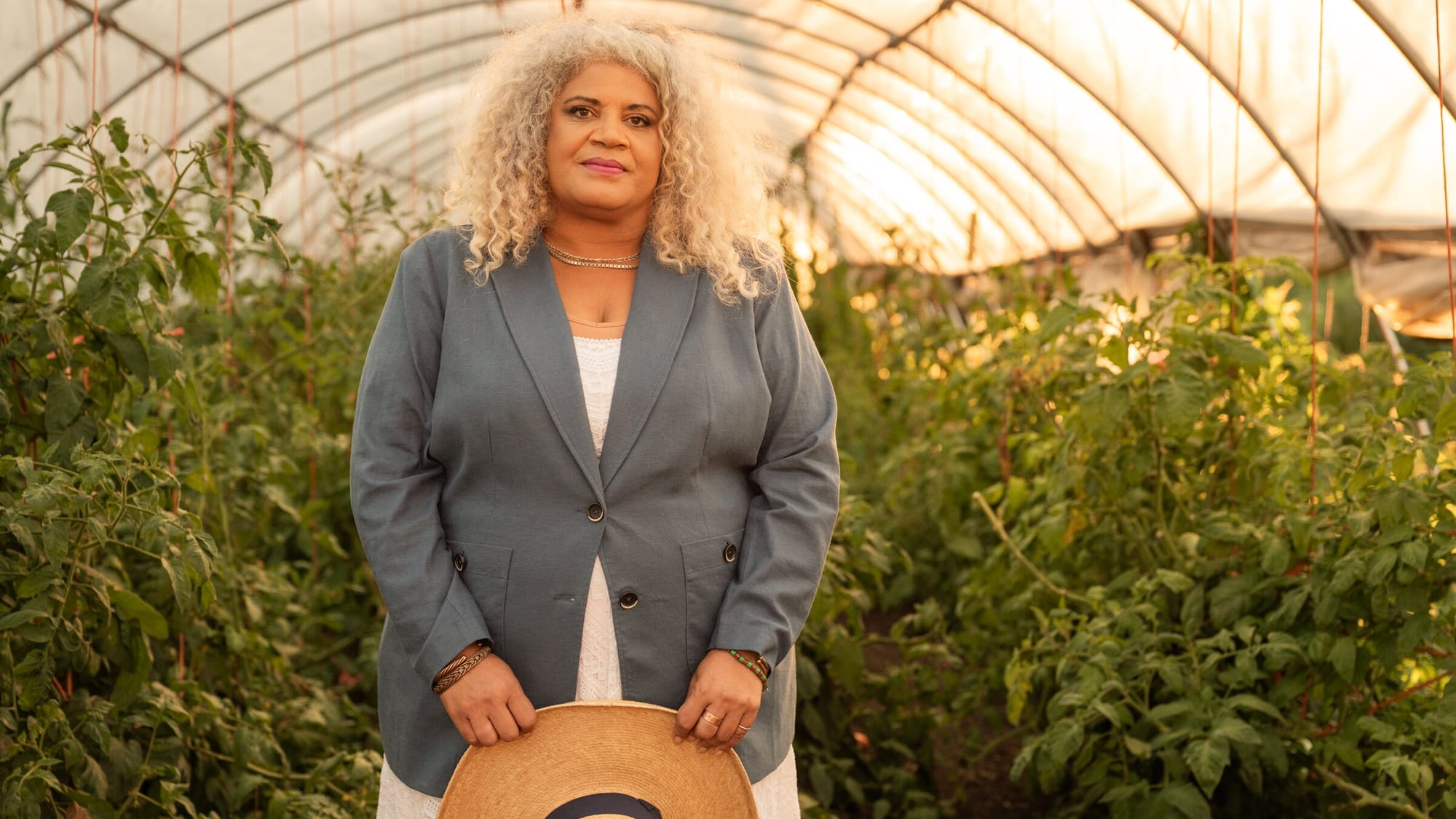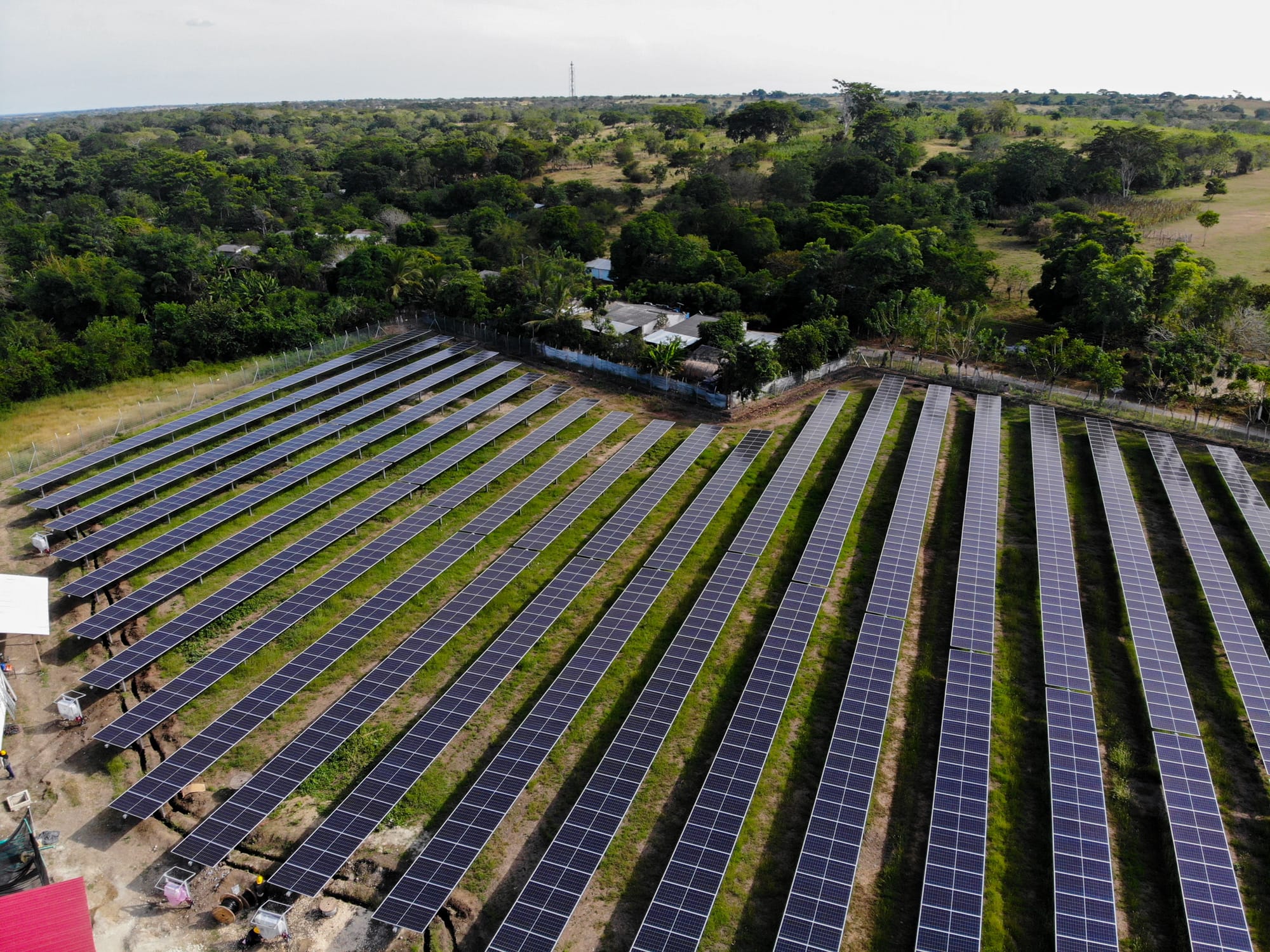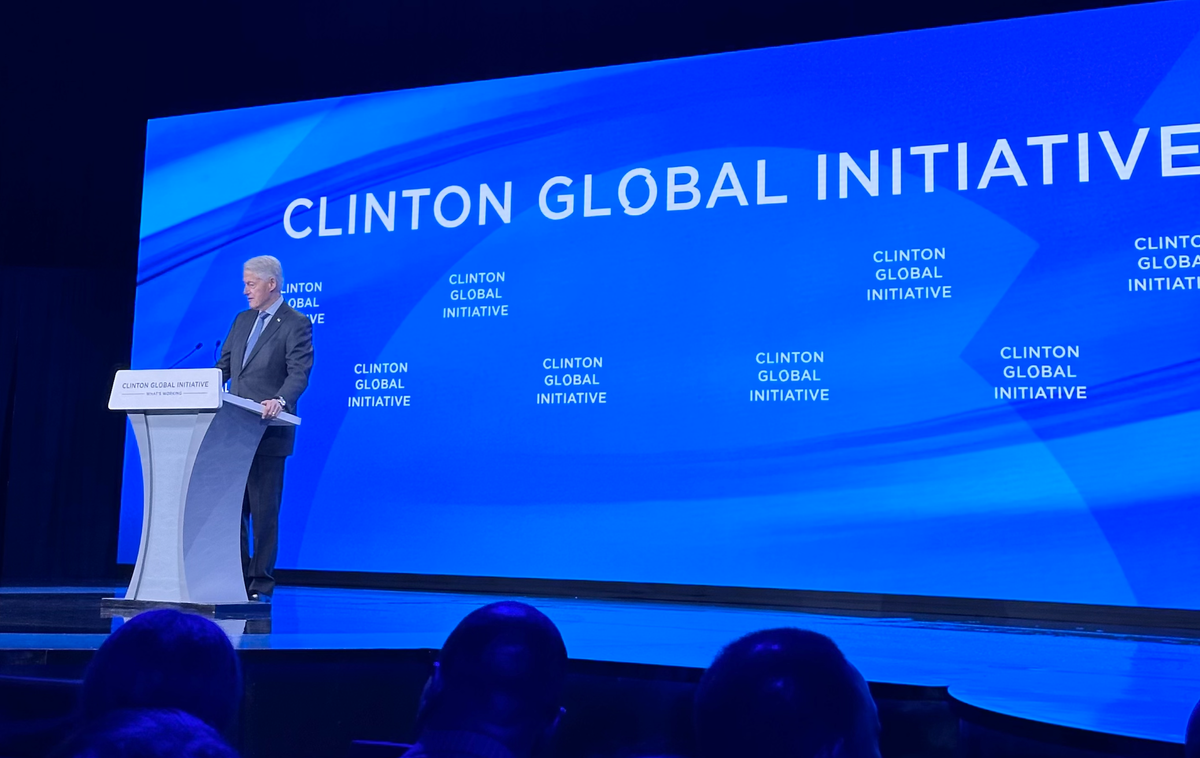This week, the Clinton Global Initiative gathered more than 3,000 cross-sector leaders for their Annual Meeting in New York during the United Nations General Assembly and Climate Week. Leaders from United States President Joe Biden to Barbados Prime Minister Mia Mottley to Bill Gates joined President Clinton, Secretary Clinton, and Chelsea Clinton to explore "what's working" in efforts to address a series of global challenges, including climate resilience, health equity, and humanitarian crises.
This was my tenth annual meeting — seven as an advisor to CGI and three as an attendee. As always, the conversations were wide-ranging, insightful, and inspiring. On the topic of climate resilience alone, meeting sessions covered a vast range of topics, from preserving the planet through sustainable land management with Amazon Frontlines’ Nemonte Nenquimo and former UNFCCC Executive Secretary Patricia Espinosa to scaling infrastructure for electric vehicles with Kentucky Governor Andy Beshear to advancing sustainable cities with Aclima founder Davida Herzl.
While the discussions are also informative and engaging, the meeting challenges participants to move beyond conversation into action. The core of CGI’s model centers on the Commitment to Action — new, specific, and measurable projects and programs made by the CGI community to advance impact worldwide. Since the launch of CGI in 2005, the community has made more than 4,000 commitments that have reached more than half a billion people in 180 countries.
"We are thrilled to bring together more than 3,000 global leaders to discuss "what's working" at this year's Clinton Global Initiative Annual Meeting. Through year-round programming and partnership building, the CGI community has catalyzed climate action across sectors and in all corners of the world. This year, we are proud to announce more than 40 CGI Commitments to Action which, upon completion, will invest $3.46 billion in climate resilience and sustainability worldwide." — Laura Barron, Deputy Director, Climate Resilience & Sustainability, Clinton Global Initiative
This year, 44 commitments have been announced to advance climate resilience and sustainability. When fully realized, these commitments will invest more than $3 billion globally to support disaster preparedness, response, and recovery efforts, nature-based solutions, renewable energy, regenerative agriculture, and more. I had a chance to connect with the teams behind seven of this year’s commitments, explore what has informed their work, and understand their model for delivering impact. From a program to make the built environment more sustainable across 15 European cities to an effort to improve climate resilience in communities in India to a major investment to cut emissions from the apparel industry, these initiatives outlined below demonstrate the power of cross-sector collaboration, blended intellectual and financial capital, and a relentless commitment to shaping a better, shared future for communities around the world.
Investing in sustainable supply chains for the apparel industry
The Apparel Impact Institute’s (Aii) CGI commitment is focused on accelerating the decarbonization of the apparel and footwear industry. As a first step, Aii is creating a $250 million Supplier Debt Fund, which will provide financial support to 125 suppliers, most of which are small and medium-sized businesses. The fund will provide capital, technical assistance, and access to networks through loans, typically under $5 million, to help suppliers adopt cleaner technologies that reduce emissions and water usage while also benefiting local communities through improved air and water quality and providing technical training for workers. Aii’s initiative, "Catalytic Capital for Apparel Decarbonization," will aim to ultimately unlock $2 billion in blended capital to reduce 100 million tonnes of CO2 emissions across 2,000 facilities by 2030.
The Apparel Impact Institute is creating a $250 million Supplier Debt Fund, which will provide suppliers capital, technical assistance, and access to loans to help suppliers adopt cleaner technologies that reduce emissions and water usage.
The commitment will first seek to reduce 10 million tonnes of CO2 emissions across target countries, including China, India, Bangladesh, and Pakistan. Alongside emission reductions, the initiative will benefit more than 10,000 local residents by improving air and water quality and offering specialized sustainability training to 200 workers.
Aii's work is informed by its successful programs, including Clean by Design and the Climate Solutions Portfolio, which have collectively reduced over 5 million tonnes of CO2. These initiatives focus on practical upgrades in energy efficiency and sustainability within the textile manufacturing sector. Additionally, Aii’s Fashion Climate Fund combines debt and equity from various investors and philanthropic and commercial investments to scale decarbonization efforts.

Aii’s existing partnerships include seven lead partners of the Fashion Climate Fund: HSBC, H&M Group, Target, PVH, Schmidt Family Foundation, Lululemon, and the H&M Foundation. Over 35 brands and retailers are committed to pooling their resources to play a catalytic role in accelerating emissions reductions in apparel production. As the team launches the $250 million Supplier Debt Fund, Aii is seeking new partnerships with financial institutions, philanthropies, and brands interested in decarbonization projects. By expanding this collaborative network, Aii aims to accelerate the transition to a more sustainable, low-carbon fashion industry.
Building a greener future in cities across Europe
The Carbon Neutral Cities Alliance (CNCA) will support up to 15 European cities in reducing embodied carbon emissions by promoting low-carbon materials and prioritizing building refurbishment for reduced embodied emissions. Their CGI commitment will help cities identify what gets built where, how projects are chosen and delivered, and how materials are made, recycled, and utilized. CNCA will also provide cities with technical support, research, and stakeholder engagement to help integrate sustainable practices into their material selection, construction methods, and regulatory frameworks.
The Carbon Neutral Cities Alliance will support up to 15 European cities in transforming processes to decide what gets built where, how projects are chosen and delivered, and how materials are made, recycled, and utilized.
The initiative will help cities like Amsterdam, London, Helsinki, Oslo, and Stockholm decarbonize the built environment and shift the construction industry towards regenerative practices that mitigate climate impact. By updating regulations and streamlining projects, CNCA aims to send clear market signals for low-carbon construction while also addressing social inequalities. The commitment will engage public housing communities, civil society, and Green Building Councils, ensuring that sustainability initiatives also foster inclusive, equitable communities.
Building on past work, including their "Embodied Carbon City Policy Framework" published in 2020, CNCA has provided European cities with actionable policy assessments. Their new commitment moves this research into practice, helping cities operationalize policies to reduce embodied carbon in real-world projects. CNCA's ongoing collaborations, such as with Cornell University's "Embodying Justice in the Built Environment" project, continue to integrate justice principles into decarbonization efforts, expanding their impact and inspiring others.
CNCA's commitment is supported by existing partnerships with cities and organizations, including Laudes Foundation and Built by Nature. Moving forward, CNCA is actively seeking new collaborations with research institutions, financial organizations to support sustainable construction, and civil society groups to further justice principles for materials resource management, new construction, and alternatives to demolition. Through their commitment and collaboration, CNCA aims to accelerate the transition to sustainable, low-carbon construction practices while advancing social equity and justice in the built environment.
Engaging the next generation of clean energy leaders in the Global South
As the world transitions to sustainable energy, 14 million new clean energy jobs will be created by 2030 while 675 million people primarily residing in least developed countries and Sub-Saharan Africa still lack access to electricity. Student Energy’s CGI commitment aims to empower youth in the Global South to participate in expanding the global clean energy market. Their team will train 2,500 young people in clean energy initiatives over the next three years, engage participants across five new membership chapters in the Global South and two Student Energy Summits, encourage 100 youth to launch 20 clean energy SMEs or social enterprises, and provide opportunities for youth to participate in global energy summits.
Student Energy will train 2,500 young people and equip them to support the green transition across the Global South.
The commitment targets regions across the Global South, including the Indian Subcontinent, Latin America, Southeast Asia, Sub-Saharan Africa, and the Middle East. The organization is committed to ensuring that at least 50% of participants are women, helping to address gender disparities in the sector. Student Energy’s past research involving over 40,000 young people globally highlighted the need for better entry points into clean energy careers, particularly for underrepresented groups. This informed their current commitment, which aims to scale up their training models to meet the growing demand for green jobs and energy solutions. The organization already has a waitlist of 4,000 youth from the target regions.
To expand this work, Student Energy is collaborating with several organizations, including New Energy Nexus, Clean Cooking Alliance, Sustainable Energy for All, Resilient 40, and the International Hydropower Association. They are seeking financial support and implementation collaborators and encourage young people and potential partners to visit their website to learn more and get involved.
Cultivating a collaborative, regenerative food system in Chicago
Urban Growers Collective (UGC) is committed to creating a sustainable community with local food production through its “Food Waste to Energy Community Regenerative Ag Systems.” The initiative is centered on developing the Green Era Campus in Auburn Gresham, Chicago, which has already completed a $35 million financing round and is capturing RNG to be used in the energy grid.
The Green Era Campus will feature a vibrant 9-acre hub with more than 250 green energy jobs, fresh produce, small business incubation, a community education center, educational programming, and community green space, including an urban farm that will grow around 125 varieties of culturally relevant fruits, vegetables, herbs, and plants. By breaking down food waste and transforming it into clean, renewable energy and nutrient-dense compost, the campus will divert 85,000 tons of food waste from landfills, which could offset approximately 42,500 metric tons of CO2.
“When I founded Chicago’s chapter of Growing Power in February 2002, I tapped into my experiences growing up farming with my father, Will Allen, who founded the original Growing Power, a nonprofit organization and land trust established in Milwaukee, Wisconsin, in 1993. Growing Power has welcomed thousands of visitors annually—creating firsthand experiences of how local food hubs can transform a community and inspiring the “Good Food Revolution.” After Growing Power closed, the Chicago office’s leadership team formed Urban Growers Collective in 2017 to continue the legacy and build upon its successes.” — Erika Allen, CEO of Urban Growers Collective

UGC works with various partners, including the Greater Auburn Gresham Development Corporation, and is open to new collaborations to advance and support its mission. The organization welcomes public involvement, including support for its capital campaign to support the Community Programming and Food Production portions of the campus, including a greenhouse, edible forest, walking trail, and Community Education Center. Potential partners and supporters are encouraged to explore their website to discover ways to contribute to this vital community-driven initiative.
Bolstering climate resilience across India
The Council on Energy, Environment and Water (CEEW) made two CGI Commitments to Action to address climate resilience in India. The first aims to enhance heat resilience across 4,500 urban local bodies (ULBs) and 800 districts with the tools and technologies to develop locally tailored, risk-informed heat action plans (HAPs). These plans focus on early heat-health warnings, vulnerability assessments, and inter-agency coordination to mitigate heat-related illnesses and deaths, with a bold goal of achieving zero heat-related deaths in Indian cities by 2030. The second CTA focuses on improving climate resilience in rainfed agriculture, especially in regions like Maharashtra. This involves updating crop calendars to reflect shifting monsoon patterns and working closely with local agencies to reduce farmers’ vulnerability to climate variability.
The Council on Energy, Environment and Water (CEEW) is improving heat and agriculture resilience to mitigate the impact of climate change on communities across India.
CEEW's targeted impact is twofold. First, the organization is working to improve the heat resilience of over a billion people living in India’s 23 heatwave-prone states, especially vulnerable groups such as the elderly, children, and outdoor workers. Second, to CEEW will support 13.6 million farmers in Maharashtra, where 80% of agriculture relies on increasingly erratic monsoons. By refining local heat risk maps and revising cropping calendars, CEEW aims to provide practical tools and data to protect at-risk populations and secure farmers' livelihoods. These efforts are designed to improve public health outcomes, reduce climate-related vulnerabilities, and strengthen sustainable agricultural practices.
CEEW's commitments build on their past initiatives that demonstrated the need for hyperlocal data and cost-effective solutions. CEEW is now scaling these efforts across the country, leveraging advanced technologies to lower the costs of HAPs and improve climate-smart agriculture practices. Their research into changing monsoon patterns underscores the urgency of updating outdated agricultural calendars to better align with modern climate realities.
CEEW is working closely with key partners, including India’s National Disaster Management Authority, India Meteorological Department, and local government bodies. They seek to expand these partnerships by collaborating with global organizations to share best practices and solutions in heat resilience and rainfed agriculture. Through these partnerships, CEEW aims to enhance collective responses to climate risks, supporting communities and sectors vulnerable to the growing impacts of climate change.
Creating value by improving wastewater management
renasys is revolutionizing wastewater treatment by creating modular Water Resource Recovery Facilities (WRRF) that aim for zero-waste, zero-discharge, and net-zero energy solutions. Their commitment targets communities with outdated wastewater infrastructure, starting in Norway, Germany, and the UK. Their advanced technology filters 99% of wastewater particles larger than 5 microns and recovers carbon resources that can be converted into energy and fertilizers. It is also adaptable to various geographic locations, from small villages to large cities, and it has the potential to reduce water contamination and generate sustainable resources for local populations.
renasys’s advanced technology filters 99% of wastewater particles larger than 5 microns and recovers carbon resources that can be converted into energy and fertilizers.
Their flagship project in Norway reflects a scalable approach designed to drive sustainability and support a circular economy. Their pilot program at the Førde Wastewater Treatment Plant has inspired their "Mission Zero" campaign, striving for zero waste, discharge, and energy consumption in wastewater processes. renasys continues to build partnerships with companies like Haver & Boecker, SWECO, KEYPLANTS, and CSI Nordics while seeking new collaborators to extend its global reach. By engaging with municipalities, climate-focused organizations, and investors, renasys aims to expand its wastewater solutions further, contributing to a cleaner, healthier future. Interested partners can join their mission through direct outreach on their website.
Scaling solar projects across Latin America
Unergy is committed to democratizing access to clean energy infrastructure in Latin America through a marketplace that allows individuals to invest as little as $10 in mid-scale solar projects. Recognizing the $2 trillion gap in sustainable investments, especially in emerging markets, Unergy aims to bridge this gap by offering profitable renewable energy opportunities. By using blockchain technology for asset fractionalization, Unergy makes it possible for retail investors to fund solar energy projects that large institutions often overlook. Their goal is to reach $100 million in investments, funding 100 mid-scale solar energy assets, which will accelerate the deployment of renewable energy solutions across the region.
Unergy is working to unlock $100 million in crowd-sourced investments for mid-scale solar energy projects across Latin America.
Unergy aims to bridge the investment gap in mid-scale solar projects while stimulating economic growth by creating jobs and supporting local economies. By making clean energy investments accessible to a wider audience, Unergy addresses the lack of liquidity for renewable energy in Latin America, contributing to both environmental and economic progress.

Unergy’s past experience with its first startup, Solenium, highlighted the liquidity challenges in funding solar energy projects in Latin America. This inspired the creation of Unergy, which has since raised over $20 million for 40 solar projects from more than 2,400 retail investors and six institutional investors. Their model, which streamlines project approval and offers double-digit returns, has demonstrated scalability and effectiveness. Unergy is actively seeking new partnerships with equity and debt sponsors to further expand their impact, as well as collaboration with NGOs to enhance community benefits through social initiatives like education and agrivoltaics.


